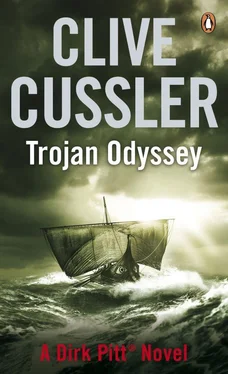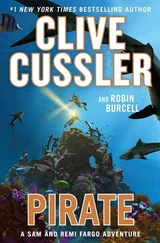"It must have a name."
"Only what the locals call it."
"Which is?" Pitt had to prompt.
"In English," Huey finally replied, "house of the invisible ones."
"Any reason?"
"They say it's because everybody who goes in is never seen again."
"The local officials never investigate?" asked Pitt.
Huey shook his head. "Nicaraguan bureaucrats keep a hands-off policy. The word is that Odyssey management has bought off every politician, judge and police chief in the country."
"How about the Red Chinese? Are they involved?"
"They're everywhere in Central America these days. They contracted with Odyssey about three years ago to build a short canal through Lake Nicaragua's western shoreline at Pena Blanca, so deep-water cargo ships can enter and exit."
"The nation's economy should have profited."
"Not really. Most all of the ships that use the canal are from a Chinese cargo fleet."
"COSCO?"
Huey nodded. "Yeah, that's the one. They always dock at the Odyssey facility."
Pitt spent the rest of the trip in silence, his mind sifting through the myriad of contradictions and unknowns of Odyssey, its strange founder and even stranger operations. As soon as Huey set the helicopter down at his company hangar two miles outside Managua, Pitt walked off by himself and called Admiral Sandecker.
As was his style, Sandecker minced no words. "Haven't you taken off for Washington yet?"
"No," Pitt replied smartly. "And we're not going to."
Sandecker knew something was on Pitt's mind and he went into neutral. "I assume you have a good reason."
"Are you aware of a huge secret facility built and owned by Odyssey on an island in Lake Nicaragua that sits directly over the tunnels?"
"The closest I can come is a report I read on Odyssey expanding a canal from the ocean into the lake to allow entry for cargo ships." Sandecker paused. "Come to think of it, the report was vague on the dock facilities the Nicaraguans were building at the port city of Granada a few miles east of Managua."
"The report was vague because the dock facilities were built at Odyssey's complex on the island of Ometepe for their private use only."
"What have you got in mind?" asked Sandecker, as if already reading Pitt's mind.
"I propose Al and I go into the complex and investigate their operation."
Sandecker hesitated. "After your narrow escape from the tunnels, you're pushing your luck."
"We're getting good at breaking and entering."
"Not funny," Sandecker said sharply. "Their security must be very tight. How do you plan to sneak inside?"
"We'll come in from the water."
"Don't you think that they have underwater sensors?"
"Actually," Pitt said pontifically, "I'd be surprised if they didn't."
Ten minutes after Sandecker conversed with Pitt, the admiral was staring at Hiram Yaeger in abject incredulity. "Are you sure about this? Your data must be in error."
Yaeger was immovable. "Max is not infallible a hundred percent of the time, but on this one I believe she's right on the mark."
"It's beyond belief," said Gunn, reading over Max's projections.
Sandecker slowly shook his head, jarred by what he read. "You're saying the tunnels were built to divert the South Equatorial Current, which would in turn cause the temperature of the Gulf Stream to drop."
"According to Max's computer model, eight degrees by the time it reaches Europe."
Gunn looked up from the data files. "The effects on European climate would be cataclysmic. The entire continent would go into a deep freeze for eight months out of the year."
"Let us not forget the effect of the Gulf Stream on the east coast of the United States, and the Maritime Provinces of Canada," added Sandecker. "Every state east of the Mississippi and along the Atlantic shore could suffer a cold as bitter as that in Europe."
Gunn said sarcastically. "Now there's a happy thought."
"The Atlantic Drift's warm surface water is controlled by temperature and salinity," Yaeger explained. "As its tropical waters move north, it mixes with the cold water coming down from the Arctic, where it becomes dense and sinks southeast of Greenland. This is called a thermohaline circulation. Then it gradually warms again and rises to the surface as it reaches Europe. The Gulf Stream's sudden drop in temperature could also cause the thermohaline circulation to collapse, a state that would accent the crises and last for several centuries."
"What would be the most immediate results of such an event?" asked Sandecker.
Yaeger spread several papers across Sandecker's desk and began quoting the data. "Death and disruption would run rampant. In the beginning, thousands of homeless people would die from frostbite or hypothermia. Many more thousands might also die when the heating supplies quickly disappear because of the staggeringly high demand. All vital river traffic would come to a standstill, locked in ice. Ports would freeze throughout the Baltic and the North Sea, stranding ships carrying oil and liquefied natural gas used for heating, not to mention millions of tons of food imported from other countries. Most agriculture yields would be cut in half. Food shortages would be magnified because of the shortened growing season. Auto transportation would come to a halt because of freezing road conditions and heavy snowfall and a lack of fuel. Airports and railroads would be paralyzed for weeks at a time. People would be more susceptible to colds, flu and pneumonia. Tourism would vanish overnight. The European economy would go into complete chaos, with no end in sight. And that's only half the story."
"So much for French winemaking and Dutch tulips," Gunn muttered.
"What about the gas sent through the pipelines from the Middle Bast and Russia?" said Sandecker. "Can't the flows be increased to alleviate the suffering?"
"A drop in the bucket when you calculate the demand, not to mention the electrical power shortages that would come with severe winter storms. Max estimates at least thirty million homes throughout Europe would be left without heat."
Gunn looked up from taking notes. "You said that was only half the story."
"Further disruption and misery would come with the rising temperatures in the late spring," Yaeger continued. "This terrible scenario will be enhanced by heavy rains and high winds. Violent and massive flooding will be the result. Rivers swelled by massive amounts of melted snow would burst their banks and flood thousands of cities and towns, destroying vital bridges as well as millions of homes. Avalanches and mud slides would bury entire towns and destroy vast stretches of highway. The loss of life following such an appalling cataclysm cannot be imagined."
Gunn and Sandecker remained silent for a few moments. Then Sandecker broke the silence.
"Why?" he asked briefly.
Gunn spoke the single thought on everyone's mind. "What do Specter and the Red Chinese have to gain by such an atrocious scheme?"
Yaeger showed the palms of his hands in a helpless gesture. "Max has yet to come up with an answer."
"Can it be Specter controls the gas coming into Europe?" queried Sandecker.
"We asked the same question and ran profiles on all the major gas producers that supply the continent," replied Yaeger. "The response was negative. Odyssey has no natural gas or oil holdings anywhere in the world. The only minerals in which Specter has an interest is a group consisting of platinum, palladium, iridium and rhodium. For those, he owns the major deposits and producing mines in South Africa, Brazil, Russia and Peru. He'd have a monopoly on the world's reserves if he could gain control of the Hall mine in New Zealand that produces as much as the other countries put together — but the mine's owner, Westmoreland Hall, has refused all offers to sell."
Читать дальше












